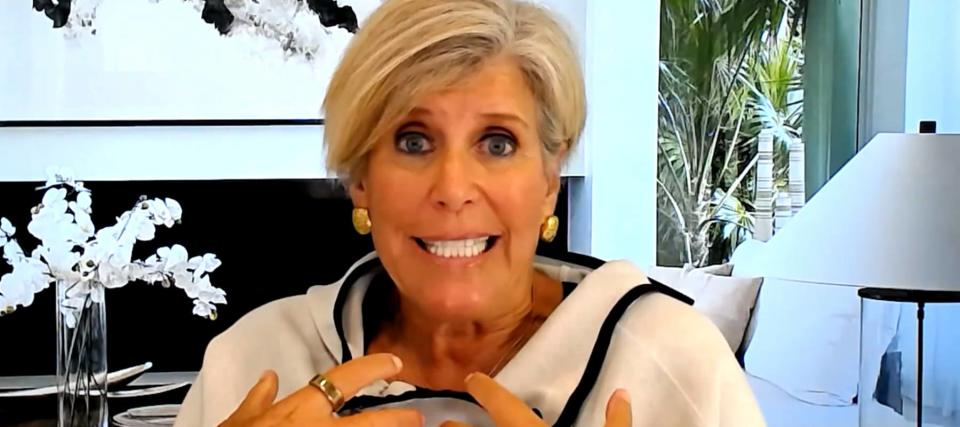Suze Orman warns Americans are 'dangerously unprepared' as her company's survey reveals 67% of them can't cover a $400 emergency expense — here's how to make sure you can

We all know we should be saving, putting a little away every paycheck for a rainy day.
But with the high cost of food, gas and housing, it’s not surprising that many Americans have very little left of their paycheck to put in a rainy day fund.
Don't miss
Rich young Americans have lost confidence in the stock market — and are betting on these 3 assets instead. Get in now for strong long-term tailwinds
Here's how much money the average middle-class American household makes — how do you stack up?
This janitor in Vermont built an $8M fortune without anyone around him knowing. Here are the 2 simple techniques that made Ronald Read rich — and can do the same for you
According to a recent survey by money maven Suze Orman's company SecureSave, 67% of Americans don't have enough money saved to cover an unexpected $400 expense. Furthermore, more than half (54%) of respondents said their savings have decreased over the last year.
“This data is a huge red flag for our country’s economy: the overwhelming majority of American households are dangerously unprepared," Orman said in a press release for the study.
That snowball effect is something Orman has seen over and over again in her career. Here's what that is and how you can prevent it from happening to you.
If you’re not saving, you’re not alone
When it comes to how people handle financial emergencies in the U.S., there are some shocking statistics.
In 2021, a third of Americans couldn’t cover a $400 emergency expense, according to the Federal Reserve.
That number spiked to 67% in 2022, and SecureSave's survey also found that only roughly 1 in 3 Americans could pay that $400 without tapping their credit cards or taking out a loan.
Orman says big problems can happen when you have to reach for your credit cards or tap into your 401(k) to cover those unexpected expenses.
It’s part of the reason she co-founded SecureSave, a company that aims to help people build up their emergency savings through their employer, similar to a 401(k).
Orman, who has written several books on personal finance and is the host of the Women & Money Podcast, sat down with Moneywise in November to talk about the importance of emergency savings.
“It's yours and sometimes things happen in life and you should have a little account that's just yours that nobody can get … just to keep you safe and sound.”
The snowball effect in action
Putting emergency expenses on a credit card might mean you’ll end up paying far more for it then you would have if you paid it in cash to begin with – and that’s when the snowball effect gets you.
Orman gives the example of what can happen when something as simple as your car battery dies.
“Now your car can't go anywhere and you have to get to work. And you don't have the money to do it.”
Orman told Moneywise a story of a woman she knew fell into this predicament, her battery died and her car broke down and she was taking Ubers to get around.
“And I said, ‘and how much does that cost you?’ She said, ‘Well, I'm putting it on my credit card.’"
Read more: This secretary in Illinois built a $7M fortune starting with $180. Here's the one powerful technique that made Grace Groner rich — and can change your life too
Orman says the woman’s car had been towed and she had to pay down traffic tickets before she could get it back. The woman was $1,100 in debt and still didn’t have her car back and working.
“And it's gonna get worse for her as well. I said, ‘Why didn't you pay the tickets when you got the tickets?’ She said ‘I didn't have the money to pay the tickets.’
What starts as a fairly innocuous issue can quickly become a financial hole that can take years to dig your way out of.
Save what you can
In a recent blog, Orman repeated her mantra on the need for savings.
"Your goal should be to have one year of living costs set aside in a savings account at a federally insured bank or credit union."
With inflation running at the highest point in decades, no one is disputing how difficult it is to save right now – but it’s also necessary.
Experts generally recommend setting aside three to six months’ worth of living expenses in normal circumstances.
While that may not be possible for many Americans, Orman told Moneywise starting small is much better than not saving at all.
“Listen, $10 is better than nothing. $50 is better than $10, $100 is better than $50. Because really, sometimes $200, $400 can make a world of difference in your situation.”
She says it’s never too late to start your “freedom account”.
“Once you start saving, and you look at it, it's like ‘Oh my God, I like it. I like it. It's not only easy, I don't miss it.”
What to read next
What do Ashton Kutcher and a Nobel Prize-winning economist have in common? An investing app that turns spare change into a diversified portfolio
Boomer's remorse: Here are the top 5 ‘big money’ purchases you’ll (probably) regret in retirement and how to prepare for them
Here's how much the average American 60-year-old holds in retirement savings — how does your nest egg compare?
This article provides information only and should not be construed as advice. It is provided without warranty of any kind.

